Residents of apartment buildings and owners of their own houses often think about whether it is possible to put a refrigerator near a gas pipe and whether such a neighborhood is safe. How to equip the kitchen space so that there will be no problems in the future.
The question of the proximity of a refrigerator and a gas pipe is often found in various forums for the repair, construction and arrangement of houses. If it is clear with a gas stove, the refrigerator must be placed as far away from it as possible, then what about the gas pipe? What problems can it cause and what do experts think about it?
The content of the article:
- Features of the refrigerator
- Risks of the proximity of the refrigerator and the gas pipe
- Possible consequences of such a neighborhood
- The advantages and disadvantages of this arrangement
- Conclusions and useful video on the topic
Features of the refrigerator
If we talk about whether it is possible to place a gas pipe behind the refrigerator, first of all, it is necessary to analyze all possible hazards and risks during the operation of refrigeration equipment.
Additionally, it will not be superfluous to consider a short refrigerator working principle. This will help in identifying potential problems.
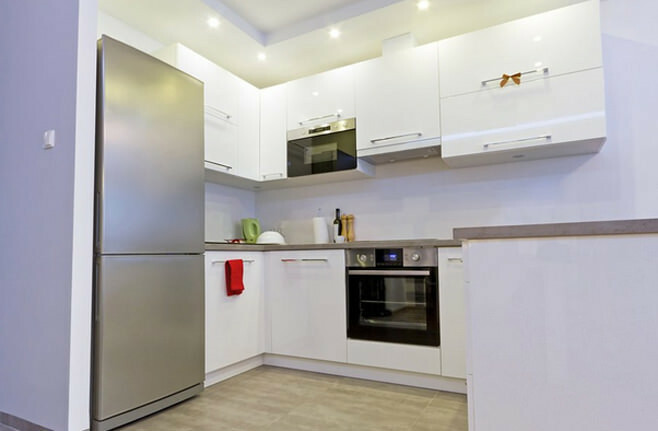
Understanding the principle of the refrigerator will help to avoid troubles in its operation and will allow you to place the kitchen set harmoniously and tastefully
Almost any modification of the refrigerator is designed so that freon gas is used in its operation, which, passing through the heat exchanger system, changes its state of aggregation. Due to this, the pressure and temperature of the gas decreases, and the temperature in the refrigerating chamber itself also drops.
At the same time, heat energy is released outside, then the temperature of the refrigerant gradually rises and it is again sent to the compressor of the device.
Risks of the proximity of the refrigerator and the gas pipe
Having considered the principle of the refrigerator, you can name several main details that you need to take a closer look at. Considering that a heat exchanger is involved in the work, compressor, evaporator, there may be certain risks.
Consequently, one should approach the choice of a place for the installation of equipment more judiciously and carefully, if possible, adhering to certain recommendations of specialists.
During heat exchange, the system gives off heat, which is why the walls of the refrigerator can get quite hot. It depends on the brand and model of the equipment. In addition, the operation of a compressor that catches up with freon and makes it move through the system is impossible without electricity.

During the operation of the refrigerator, its walls will certainly heat up, so take this important aspect into account when installing the equipment.
As a result of operation, there are already two danger factors. Therefore, we will consider in detail what you should pay close attention to:
- Heat transfer through the walls. With some types of equipment, the temperature can reach quite high values. Manufacturers, arranging test drives of equipment, recorded an abnormal increase in temperature, up to 50-60 degrees. The indicators are high, given the special arrangement of equipment in an apartment or house. An increase in temperature to such indicators is directly associated with malfunctions in the operation of equipment parts.
- Electricity itself is dangerous. Bare wire, sparks and short circuits from faulty components can transmit current to the pipe. A short circuit in the wiring of the refrigerator, which is close to the gas main, can theoretically lead to a fire or power supply to the gas pipe.
Are the presented risks really dangerous when operating refrigeration equipment that is installed near a gas pipe? What exactly can you encounter in domestic use?
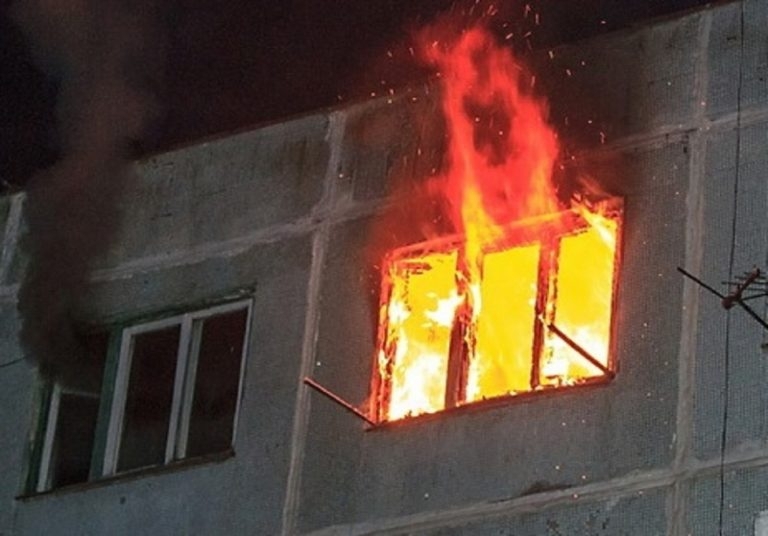
A fairly common consequence of faulty wiring in an apartment or problems with refrigerator components is a fire in the room
Possible consequences of such a neighborhood
Let's assume that the refrigerator is located close to or close to the gas pipe. What can happen in this situation?
First, there is not enough air flow for the operation of the refrigeration equipment itself. If you look at the instructions for use, it indicates that for normal operation it is imperative to leave a ventilation gap.
If this is excluded during installation, a quick failure of the equipment is possible and, as a result, expensive repairs. Although some manufacturers of equipment do not have such recommendations, due to the peculiarities of the design itself.
Secondly, if the compressor is faulty, the latter may overheat, followed by the closure and heating of the gas pipe. Gas is known to be an increased hazard. Overheating of the compressor will lead to excessive heating of the refrigerator walls.
According to experts, if we consider a possible increase in the temperature of the walls, then the indicators are unlikely to be able to exceed the mark of 60 degrees (this is also indicated by the studies of equipment manufacturers). This is not even an average, but the maximum. And even if we take into account that the wall will be at a distance of 20-40 mm from the pipe, this factor will not be able to somehow affect the gas pipeline system.
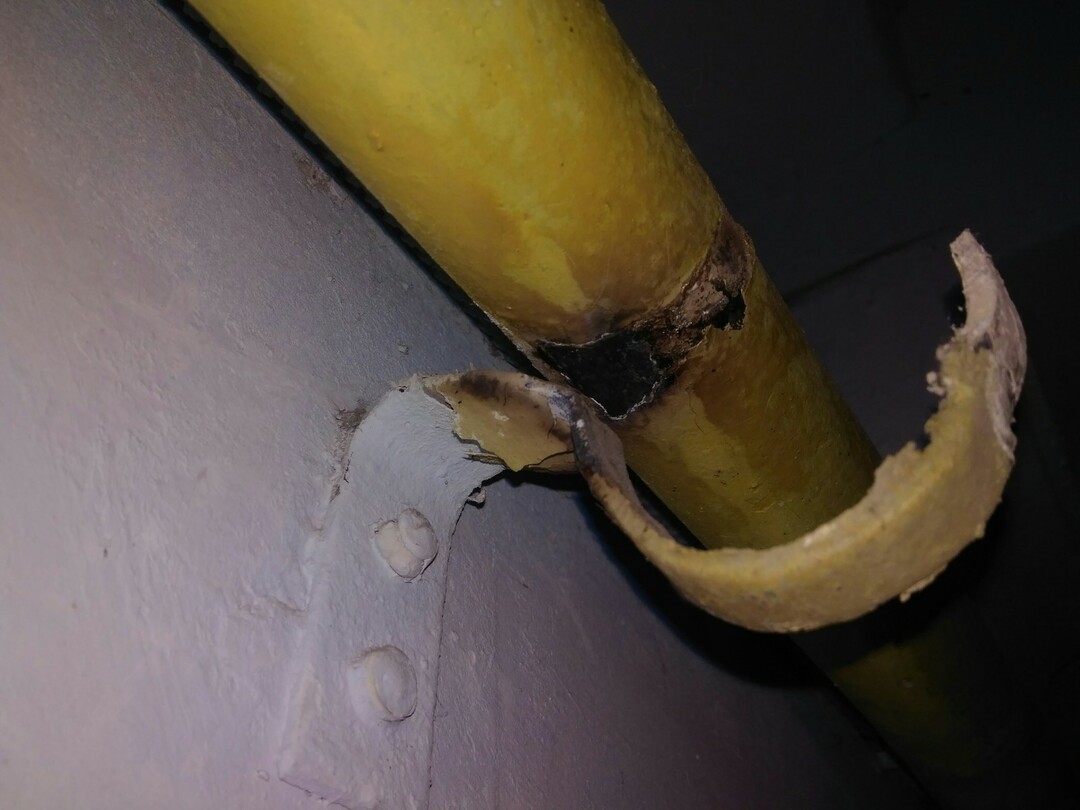
If the gas pipe is in contact with the current, it will not be difficult to notice. In places of welding or holders, the paint on the pipe begins to peel off and burn
There is no danger and with full adjoining. Heating the pipe is possible and real, but no harm will follow from this, with some exceptions. With constant exposure to elevated temperatures, even if not 60 degrees, but only 30-40, the paint and varnish coating of the pipe will be exposed. Therefore, the maximum that threatens in this case is the need pipe painting.
Thirdly, a refrigerator installed nearby may fail and short-circuit to a pipe. A very common reason why fires occur in apartments is a malfunction of the compressor or wiring in the refrigerator. Although in this case, the opinion of experts is different. Even if a bare cable or spark hits the pipe, there is no danger.
This point of view is supported by a number of reasons:
- Gas pipes are made of metal and go into the ground, therefore, upon contact with an electric wire, a banal phase grounding will occur. Even if the machine installed on the meter does not work, the phase will be grounded and, as a result, it does not pose any threat to a person.
- Suppose if the underwater cable is rubber and gets exposed to a bare cord or spark from a faulty refrigerator, what happens? Most modern gas stoves are connected with a protective neutral conductor, so there is no danger.
- If the stove is working properly, the connections are sealed, with a broken cable, spark and other malfunctions of refrigeration equipment, there is no danger to the consumer. Except in cases where electric shock occurs directly from a faulty device.
On the forums, you can find a lot of rather contradictory information. And, often, the opinion of ordinary users differs from the statements of experts. They take a different point of view, and here's why.
Most of the housing stock in the Russian Federation was built during the Soviet era. At that time, the grounding of gas pipes was not so widespread. As such, many residents of high-rise buildings and the private sector, in order to reduce consumption and reduce the performance of electricity meters, use gas pipes for unwinding, throwing zero at them.
And the norms for wiring wiring around the house were somewhat different, therefore, in part, the statements of ordinary citizens may be valid.
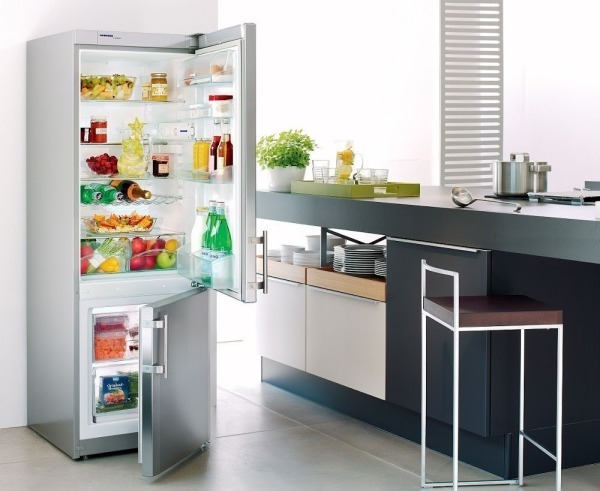
An important condition for the proper functioning of the refrigerator is that there is sufficient air circulation around it. Therefore, it is imperative to leave at least a minimum distance between the wall and the refrigerator.
In view of this, there is a danger of not only a fire, but also an electric shock to a person. Therefore, a refrigerator installed close by can simply shock, and if current flows from it to the pipe, then it is likely that a fire could occur. In this case, you should think about whether it is worth endangering the health and life of yourself and your loved ones.
As for the statement about insufficient ventilation of the space between the refrigerator and the wall, there is some common sense in this. For the normal operation of most refrigerators, it is imperative to provide adequate air flow to cool the walls.
At the same time, with the development of technologies, the production of a new type of refrigeration equipment is also moving, for which does not matter at all where it will be placed, it does not require a sufficient air passage and etc.
An example of this is closed-type refrigerators that are mounted in kitchen sets and represent a single "composition" with other kitchen appliances. Therefore, here you need to pay attention to what type of refrigerator you plan to install.
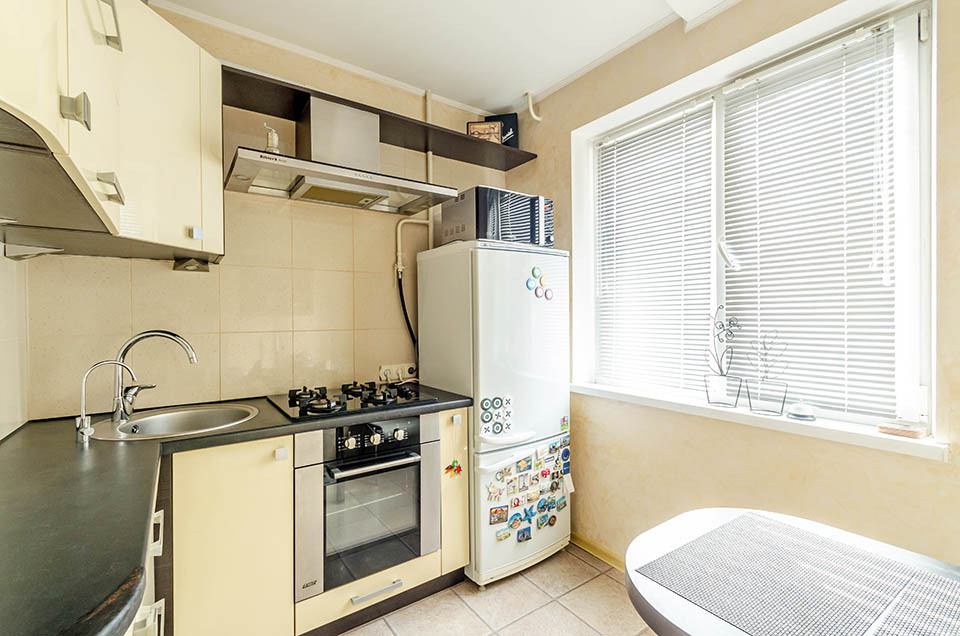
Compliance with simple safety measures and the recommendations of the manufacturer of refrigeration equipment will make it possible to equip the kitchen area with comfort and convenience for use.
There are also many comments on the forums that inspection bodies or controllers often frighten tenants with the danger of such accommodation, literally threatening with fines and cutting off the supply of blue fuel. Of course, there is no legislative responsibility in this regard for consumers, but, nevertheless, unnecessary proceedings are not needed by anyone.
The history of one of the Moscow high-rise buildings seemed relevant. Complaints were filed against the owner of the apartment, and then statements were written to the court because of the noise that the refrigerator makes. It sounds strange and ridiculous, but the complaints were not unfounded.
In the course of numerous checks, including with the involvement of district inspectors, it was found that the owners, while updating the interior, installed the refrigerator close to the gas pipe. Due to a faulty compressor, at the time of start-up and operation, the latter transmitted vibration to the gas pipe. Subsequently, the noise, the rumble from the operation of the refrigerator got all the neighbors along the riser.

One of the first symptoms of an imminent compressor failure is the increased noise when it starts. Therefore, the change in sounds emitted by the device should be considered carefully.
The situation is not pleasant, but during the court session the owner of the apartment was ordered to correct the situation. As soon as the refrigerator was removed from the chimney, the noise disappeared. At the same time, the tenant himself did not feel discomfort.
For other causes of noise and vibration in gas pipes, see this stuff.
As you can see, the proximity of the refrigerator and the gas pipe poses no danger, it is necessary only observe the distance, monitor the health of the equipment, and eliminate the arisen breakage.
The advantages and disadvantages of this arrangement
In order to fully appreciate all the pros and cons, one should consider what difficulties and conveniences will have to be faced.
First, let's define the advantages:
- The ability to place a refrigerator and a gas pipe in your kitchen according to your preferences, focusing on interior design, etc. It is not uncommon that the layout of the kitchen is done to the detriment of simple rules of technology. security.
- Convenience of cleaning the room. By installing the refrigerator at a short distance, it is possible to reduce the area for the accumulation of dust, dirt and other debris.
Oddly enough, but more advantages could not be found. As mentioned above, only compliance with the rules for the installation and use of equipment can guarantee safety during its operation.
Next, let's dwell on the disadvantages:
- difficulty in servicing equipment;
- too close arrangement of refrigeration equipment to the wall creates not the right conditions for its operation;
- in some cases overlapping gas valve is located behind the refrigerator, so it does not allow shutting off the gas supply, and in the case of a visit, the gas service employee will have to explain why there is no free access to the gas tap.
Often, controllers or gasmen refer to the fact that it is forbidden, in principle, to close the gas system for access by foreign objects. However, they do not provide the exact wording or references to laws or acts.
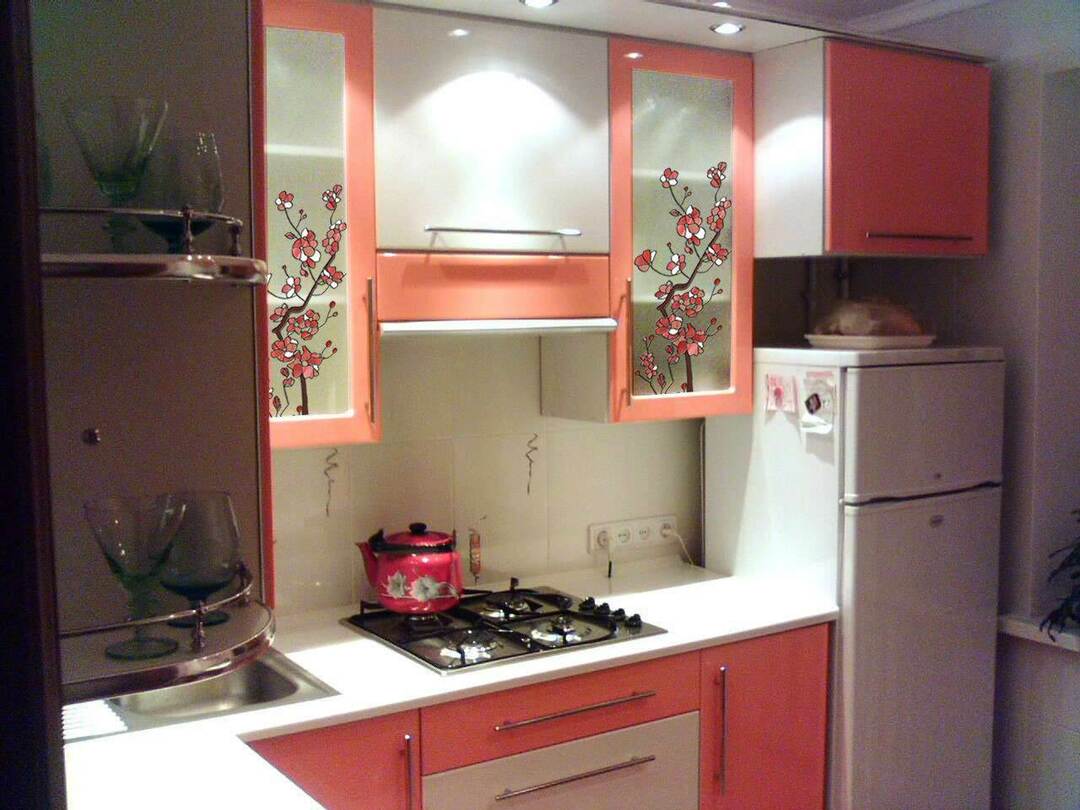
In the gas services, they make a remark for the incorrect, in their opinion, the placement of the refrigerator, which closes access to the meter for verifying the data, as well as the control valve
Having studied this issue, we also did not find clear concepts and requirements for the placement and location of a gas pipe in Russian legislation, except for technical regulations. But it does not talk about how far from the gas pipe it is allowed to place the refrigerator.
Conclusions and useful video on the topic
When deciding how to place the refrigerator correctly, you need to build on the principle of operation of the equipment, since this can directly affect the durability and functionality of the work of the latter:
As you can see, there are no legislative norms and rules for the placement of refrigeration equipment near the gas pipe. According to experts and manufacturers of refrigerators, to prevent breakdowns and fires, as well as other problems, equipment must be placed at a sufficient distance.
If the gas pipe cannot be completely left open, a gap of 50-60 mm is allowed. At the same time, we recommend taking care of free access to the meter and valve in order to avoid unnecessary disputes with the inspection authorities.
Do you have your own opinion on this issue? Please share it with our readers in the block below. Tell us if you had to defend such a placement with the regulatory authorities.


